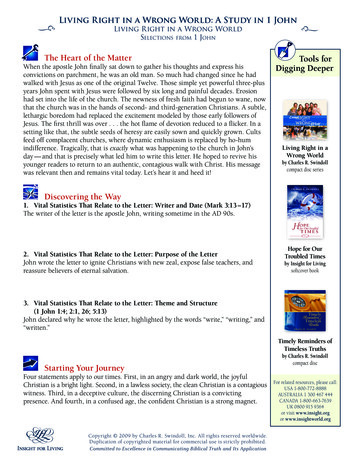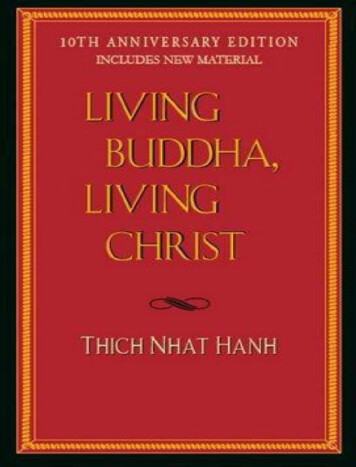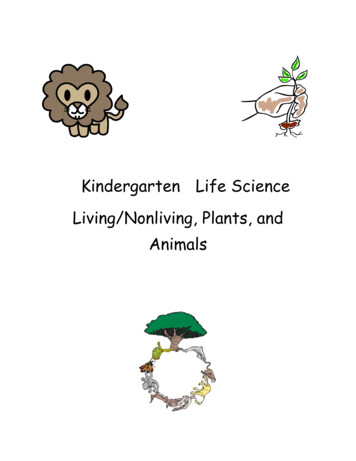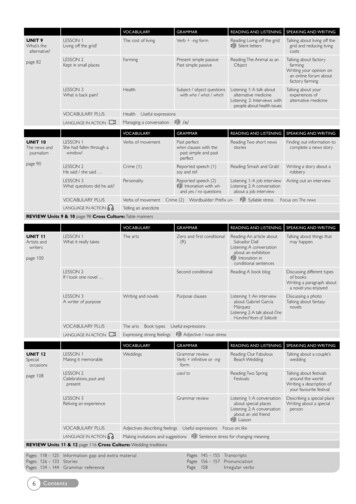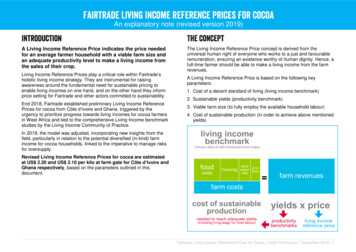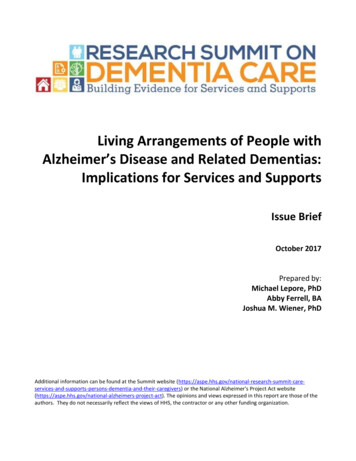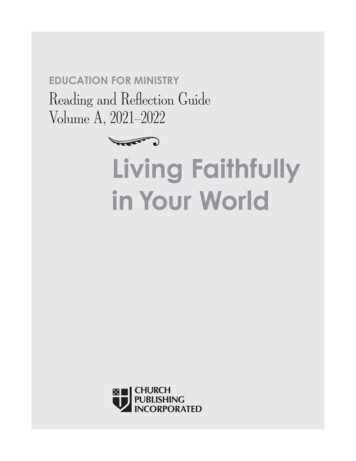
Transcription
EDUCATION FOR MINISTRYReading and Reflection GuideVolume A, 2021–2022fLiving Faithfullyin Your World
Copyright 2021 by The University of the South,335 Tennessee Avenue, Sewanee, TN 37383All rights reserved. No part of this book may be reproduced, stored in a retrievalsystem, or transmitted in any form or by any means, electronic or mechanical,including photocopying, recording, or otherwise, without the written permissionof the publisher.Unless otherwise noted, the Scripture quotations are from New Revised StandardVersion Bible, copyright 1989 National Council of the Churches of Christ in theUnited States of America. Used by permission. All rights reserved worldwide.Used by permission:“On Being Theologically Literate” from Modern Believing 38 1997 by LiverpoolUniversity Press.“God as Trinity: An Approach through Prayer” from We Believe in God by StephenSykes 2006 by The Archbishop’s Council and is reproduced by permission ofChurch House Publishing copyright churchofengland.org.Kaleidoscope Institute materials reprinted under license #20210701.Church Publishing19 East 34th StreetNew York, NY 10016Cover design by Jennifer Kopec, 2Pug DesignTypeset by Beth OberholtzerISBN-13: 978-1-64065-451-8 (paperback)ISBN-13: 978-1-64065-452-5 (ebook)Printed in Canada
ContentsviiviiiixxiiixivAcknowledgmentsAbout the AuthorsOverview of the Year: Reading Assignments for Volume AAbout Online ResourcesInclusiveness PolicyPART I: THE GUIDE3Week One: Orientation and OrganizationUnit One: Spiritual Autobiography and Listening182734404348Week Two: Faithful Living Is ContextualWeek ThreeWeek FourWeek FiveWeek SixWeek SevenUnit Two: Theological Reflection as a Life Skill526265697275Week Eight: Theological Reflection Is a Life SkillWeek NineWeek TenWeek ElevenWeek TwelveWeek ThirteenFirst Interlude: The Dream of God8082Week FourteenWeek FifteenUnit Three: Developing a Sustaining Spirituality86104107111115123Week Sixteen: The Spiritual PersonWeek SeventeenWeek EighteenWeek NineteenWeek TwentyWeek Twenty-oneREADING AND REFLECTION GUIDE, VOLUME A iii
ContentsUnit Four: Integrating Belief, Behavior, and Doctrine130138144148152157Week Twenty-two: “Doing” TheologyWeek Twenty-threeWeek Twenty-fourWeek Twenty-fiveWeek Twenty-sixWeek Twenty-sevenSecond Interlude: The Church Cracked Open162 Week Twenty-eight164 Week Twenty-nineUnit Five: Vocation168179184187191195Week Thirty: Mission, Vocation, and GiftsWeek Thirty-oneWeek Thirty-twoWeek Thirty-threeWeek Thirty-fourWeek Thirty-five198 Week Thirty-six: Closing the YearPART II: RESOURCESSupplemental Readings in the Christian Tradition206 Week Three, Reading Assignment for Year FourOn Being Theologically Literate215 Week Five, Reading Assignment for Year OneThe Priestly Creation Story233 Week Thirteen, Reading Assignment for Year FourGod as Trinity245 Week Twenty, Reading Assignment for Year OneMicahResources for Listening and Spiritual Autobiography250252iv Spiritual Autobiographies: Some GuidelinesListening Skills253 Types of Listening254 Practice for Developing Effective Listening SkillsREADING AND REFLECTION GUIDE, VOLUME A
Contents256 The Art of Framing Questions256 Helpful Questions257 Unhelpful QuestionsResources for Reflecting Theologically260 Primary Aspects of Theological Reflection261 The EfM Four-Source Model262 Theological Reflection in EfM262 Select Bibliography for Theological Reflection263 The Basic Structure of EfM Theological Reflectionin Four Movements264 Theological Reflection Process Chart265 Four Phases of Movement in Theological Reflection266 Framework for Theological Reflections267 Unpacking the Framework for Theological Reflections268 Other Comments on Framework Application270 Theological Reflection in a Group273 Theological Reflection in MotionExamples of Theological Reflection278294The Action Source278 Theological Reflection Beginning with a Personal Experience (1)279 Theological Reflection Beginning with a Personal Experience (2)280 Theological Reflection Beginning with a Personal Experience (3)282 Theological Reflection Beginning with a Personal Experience (4)284 Theological Reflection Beginning with a Personal Experience (5)286 Theological Reflection Beginning with a Dilemma(Action Source) (1)288 Theological Reflection Beginning with a Dilemma(Action Source) (2)291 Theological Reflection Beginning with a Wide-angle Lens(Action Source)The Tradition Source294 Theological Reflection Beginning with Christian Tradition(Scripture) (1)297 Theological Reflection Beginning with the Christian Tradition(Scripture) (2)299 Theological Reflection Beginning with the Christian Tradition(3)300 Theological Reflection Beginning with a Wide-angle Lens(Tradition Source)READING AND REFLECTION GUIDE, VOLUME A v
Contents303 Theological Reflection Beginning with a Mind Map(Tradition Source)305 Theological Reflection Beginning with a Provocative Word(Tradition Source)306 The Culture Source306 Theological Reflection Beginning with a Social Concern(Culture Source) (1)308 Theological Reflection Beginning with a Social Concern(Culture Source) (2)311 Theological Reflection Beginning with the Culture Source312 Theological Reflection Beginning with a Wide-angle Lens(Culture Source)315 Theological Reflection Beginning with a Provocative Word(Culture Source)316 Theological Reflection Beginning with a Movie, Video, orTelevision Episode (Culture Source)318 The Position Source318 Theological Reflection Beginning with a Personal Position (1)320 Theological Reflection Beginning with a Personal Position (2)322 Theological Reflection Beginning with Multiple PersonalPositionsResources for Community Life326329333335vi Group Life: The SeminarIssues in the Life of a Seminar GroupActivities that Nurture Group LifeTools from the Kaleidoscope Institute335 The Cycle of Gospel Living337 Mutual Invitation338 Respectful Communications GuidelinesREADING AND REFLECTION GUIDE, VOLUME A
AcknowledgmentsA revision by definition is not sui generis. Although this series of Readingand Reflection Guides may look different from previous editions of EfMmaterials and although it may be organized differently, it is nonethelessbuilt on a framework that has evolved over more than forty years of Education for Ministry. Those who have some years of acquaintance with the program will recognize what the new format owes to components developedfor its predecessors, among them parallel guides, common lessons, and themany variations of EfM’s central discipline of theological reflection.The developers of those foundational components are by now nearlylegion and include not only founder Charles Winters and succeeding leaderslike John de Beer and Edward de Bary but also the many EfM coordinatorsand trainers whose work with mentors all over the globe and over time hasshaped the program.Education for Ministry has been from its inception an experiential andcollaborative project. The principal author in this series is Richard E. Brewer,who has a long history of writing and curriculum design in EfM. Significantcontributions also were made by Angela Hock Brewer and myself as managing editor for the series. In addition, several of the essays and resources,some adapted, others left as originally published in the previous edition,have long been a part of the EfM program, designed, written, and refinedby a number of contributors over the years. We are grateful for their workand know that we can look to the future of EfM only because we stand onthe shoulders of giants.This Volume A marks the beginning of the third cycle of this curriculum,a grace its authors consider with grateful amazement. Each four-year cyclehas included revisions on the original revisions in response to feedbackfrom seminar participants and mentors who take their learning and theirformation for ministry with great seriousness, and in response to the changing needs of God’s creation that we are called to serve. It is only with theassistance of the whole EfM community that this program continues totransform lives.Karen M. Meridith, series editorExecutive Director of Education for MinistrySewanee, TennesseeMarch, 2021READING AND REFLECTION GUIDE, VOLUME A vii
About the AuthorsRichard E. Brewer (Rick) is a retired Episcopal priest who served in parochialministry and in adult Christian formation for forty years. A graduate of theUniversity of the South and The General Theological Seminary, he has livedin Oklahoma most of his life and served as priest and educator in Tulsa andStillwater Episcopal churches. Additionally, he developed and directed theDeacon Formation Program for the Episcopal Diocese of Oklahoma.Rick first learned about EfM in 1975 from Dr. Charles Winters, the originator and first director of the program. He has been an EfM trainer since1978, and a diocesan coordinator, a mentor, and interim assistant directorfor the EfM program. He conceived and edited the Common Lesson seriesfor the first revision of the EfM materials. He coauthored the Parallel Guidesand numerous common lessons with the Reverend John de Beer.Angela Hock Brewer considers herself a lifelong Episcopalian, although shespent her first twelve years in the Roman Catholic Church. A graduate ofthe University of Oklahoma, she has served as the Oklahoma DiocesanChair for Lay Ministry and on the Diocese of Northwest Texas Commissionon Ministry for Lay Ministry. Angela is a graduate of Education for Ministryand has served the program for many years as an EfM mentor and trainer.In addition to their work together on the EfM Reading and ReflectionGuides, Rick and Angela co-wrote Practically Christian: A Guide to PracticalChristian Prayer, Action, and Reflection. They co-directed Opportunities for AdultChristian Education and Spirituality (OACES), Inc., which developed a varietyof adult Christian formation learning guides and a comprehensive ministryformation program for the Episcopal Diocese of Nebraska.Karen M. Meridith is the executive director of Education for Ministry andassociate director of the Beecken Center at the School of Theology of theUniversity of the South in Sewanee, Tennessee. She was called to her position in 2010 with the charge to re-envision and redesign the Education forMinistry curriculum. Karen is the managing editor for the four-volume EfMReading and Reflection Guide series, a contributing writer, and responsiblefor selecting the textbooks used in the curriculum. A graduate of the University of South Carolina and Episcopal Divinity School, she did advancedstudy in English Literature at Auburn University and doctoral studies inChristian Spirituality at Boston University. Karen also is a graduate of Education for Ministry and has served as a mentor in the Dioceses of SouthernVirginia and Tennessee. An experienced educator and administrator, shehas developed curricula and programming for Christian formation at local,diocesan, and national levels of the Episcopal Church.viii READING AND REFLECTION GUIDE, VOLUME A
Overview of the Year: Reading Assignmentsfor Volume A, 2021–2022Notes1. Common readings at the beginning of each unit are read by all years.2. Assignments for Years One and Two marked with an asterisk are readingsin the Bible. Chapters in the survey texts are numbered. When bothare assigned, it is suggested that the Bible be read before the survey textchapters. Supplemental essays for individual years are in Part II of theReading and Reflection Guide.3. Readings in the interludes and in each of the texts for Years One andFour are indicated by name of the author(s).WEEKUNITYEAR ONEYEAR TWOYEAR THREECOLLINS, YEECOLLINS, POWELLMACCULLOCH1IntroductoryMeetingOrientation andOrganizationOrientation andOrganizationOrientation andOrganizationYEAR FOURFORD, MCINTOSH,SEDGWICK, PEACEOrientation andOrganization2Unit OneCommon Reading:Common Reading:Common Reading:Common Reading:SpiritualFaithful LivingFaithful LivingFaithful LivingFaithful LivingAutobiographyIs ContextualIs ContextualIs ContextualIs Contextualand What Are BiblicalIntroductionIntroductionValues?1 Greece and Rome1 The Near1 Frames ofEastern ContextReference2 The Nature of2 A Right to Life?PentateuchalNarrativeBallard essay:On BeingTheologically Literate,RRG Pt II, 206–214Ford:1 Introduction4Yee:Preface,IntroductionCollins:2 Israel3 The Bible andGender4 Marriage andFamily5 The Bible andthe Environment6 Slavery andLiberationFord:2 Theology andReligious Studies5* Genesis 1–11Collins:3 The PrimevalHistoryThe PriestlyCreation StoryRRG Pt II, 215–232Collins:7 Violence and Zeal8 Social Justice inthe Hebrew Bible9 Social Justice inthe Shadow of theApocalypseThe Authority ofthe BibleFord:3 Thinking of God3 A CrucifiedMessiahREADING AND REFLECTION GUIDE, VOLUME A ix
Overview of the Year: Reading Assignments for Volume A, 2021–2022WEEKUNITYEAR ONEYEAR TWOYEAR THREECOLLINS, YEECOLLINS, POWELLMACCULLOCHYEAR FOURFORD, MCINTOSH,SEDGWICK, PEACE6* Genesis 12–50Collins:4 The PatriarchsPowell: Preface1 The NTBackground: TheRoman World2 The NTBackground: TheJewish World4 BoundariesDefined4 Living before God7* Exodus 1–15Collins:5 The Exodus fromEgyptPowell:3 The NewTestament Writings5 The Prince: Allyor Enemy?Ford:5 Facing EvilCommon Reading:TheologicalReflection Isa Life SkillCommon Reading:TheologicalReflection Isa Life SkillCommon Reading:TheologicalReflection Isa Life SkillCommon Reading:TheologicalReflection Isa Life SkillPowell:4 Jesus5 The Gospels6 The ImperialChurchFord:6 Jesus Christ7 DefyingChalcedon: Asiaand AfricaFord:7 SalvationUnit TwoTheologicalReflection asa Life Skill89* Exodus 16–40Collins:6 Revelation atSinai10* Leviticus* Matthew* NumbersPowell:Collins:6 Matthew7 Priestly Theology:Exodus 25–40,Leviticus and Numbers11* DeuteronomyCollins:8 Deuteronomy12Yee:* Luke9 The Making of1 Character,Powell:Latin ChristianityConflict, and8 LukeCovenant in Israel’sOrigin TraditionsFord:9 Experience,Knowledge, Wisdom10 Theology for theThird Millennium13* Joshua* John10 Latin* JudgesPowell:Christendom:Collins:9 JohnNew Frontiers9 Joshua10 JudgesCoakley Essay:God as Trinity,RRG Pt II,233–244* Mark8 Islam: The GreatPowell:Realignment7 MarkFord:8 Through the Pastto the Present14First InterludeThe Dreamof GodCommon Reading:Dozier:Chapters 1 3,Common Reading:Dozier:Chapters 1 3Common Reading:Dozier:Chapters 1 3Common Reading:Dozier:Chapters 1 315First InterludeThe Dreamof GodCommon Reading:Dozier:Chapters 4 5Common Reading:Dozier:Chapters 4 5Common Reading:Dozier:Chapters 4 5Common Reading:Dozier:Chapters 4 5Common Reading:The SpiritualPersonCommon Reading:The SpiritualPersonCommon Reading:The SpiritualPersonCommon Reading:The SpiritualPersonUnit ThreeDevelopinga SustainingSpirituality16x READING AND REFLECTION GUIDE, VOLUME A
Overview of the Year: Reading Assignments for Volume A, 2021–2022WEEKUNITYEAR ONEYEAR TWOYEAR THREECOLLINS, YEECOLLINS, POWELLMACCULLOCHYEAR FOURFORD, MCINTOSH,SEDGWICK, PEACE17* 1 Samuel* 2 SamuelCollins:11 1 Samuel12 2 Samuel* The Acts of the11 The West:ApostlesUniversal EmperorPowell:or Universal Pope?10 ActsMcIntosh:1 Mysteries of Faith2 The New Encounterwith God18* 1 Kings* 2 KingsCollins:13 1 Kings 1–1614 1 Kings 17–2 Kings 25Powell:12 A Church for11 New TestamentAll People?Letters12 PaulHyperlinks 11.3–11.5McIntosh:3 The Splendor of God4 The Voice of God19Yee:* Romans2 Intersections ofPowell:Ethnicity, Gender,13 RomansSexuality, and Nation13 Faith in aNew RomeMcIntosh5 The Humanity of God20* Amos* HoseaCollins:15 Amos and Hosea* 1 Corinthians* 2 CorinthiansPowell:14 1 Corinthians15 2 Corinthians14 Orthodoxy:More Than anEmpireMcIntosh:6 The Glory ofHumanity21* Galatians15 Russia: ThePowell:Third Rome16 Galatians22* Micah* Isaiah 1–39Micah, RRG Pt II245–248Collins: 16 IsaiahUnit FourCommon Reading:Common Reading:Common Reading:Integrating“Doing” Theology“Doing” Theology“Doing” TheologyBelief, Behavior,and DoctrineMcIntosh:7 The Drama ofthe CosmosCommon Reading:“Doing” Theology23* Jeremiah* Ephesians16 Perspectives on Sedgwick:* LamentationsPowell:the True ChurchPreface, Introduction,* Ezekiel17 Ephesians1 Describing theCollins:Christian Life17 The Babylonian Era18 Ezekiel24* Isaiah 40–66* Philippians17 A House Divided Sedgwick:* Jonah, et al.* Colossians2 An AnglicanCollins:Powell:Perspective19 Additions to18 Philippiansthe Book of Isaiah19 Colossians20 Postexilic Prophecy25Yee:3 The Challenge ofViolence and Genderunder Colonization* 1 Thessalonians18 Rome’s Renewal Sedgwick:* 2 Thessalonians3 Incarnate LovePowell:20 1 Thessalonians21 2 Thessalonians26* 1 Timothy* 2 Timothy* Titus* PhilemonPowell:22 The PastoralLetters23 Philemon* Ezra* Nehemiah* 1 Chronicles* 2 ChroniclesCollins:21 Ezra andNehemiah22 The Books ofChronicles19 A Worldwide Sedgwick:Faith4 Love and JusticeREADING AND REFLECTION GUIDE, VOLUME A xi
Overview of the Year: Reading Assignments for Volume A, 2021–2022WEEKUNITYEAR ONEYEAR TWOYEAR THREECOLLINS, YEECOLLINS, POWELLMACCULLOCHYEAR FOURFORD, MCINTOSH,SEDGWICK, PEACE27*Psalms* Hebrews20 Protestant Sedgwick:* Song of SongsPowell:Awakenings5 The Practices of FaithCollins:24 Hebrews6 The Call of God23 Psalms andAppendixSong of Songs28SecondCommon Reading:Common Reading:Common Reading:Common Reading:Interlude Spellers: Spellers: Spellers: Spellers:The duction,Cracked OpenChapters 1 4Chapters 1 4Chapters 1 4Chapters 1 429SecondCommon Reading:Common Reading:Common Reading:Common Reading:Interlude Spellers: Spellers: Spellers: Spellers:The ChurchChapters 5 8,Chapters 5 8,Chapters 5 8,Chapters 5 8,Cracked OpenConclusionConclusionConclusionConclusion30Unit FiveVocationCommon Reading:Mission, Vocation,and Gifts31*Proverbs* James21 Enlightenment:* JobPowell:Ally or Enemy?* Ecclesiastes25 James(Qoheleth)Collins:24 Proverbs25 Job andQohelethCommon Reading:Mission, Vocation,and GiftsCommon Reading:Mission, Vocation,and GiftsPeace, Rose, Mobley:ForewordIntroductioni Encounteringthe Neighbor32*Ruth* EstherCollins:26 The HebrewShort Story* 1 Peter* 2 PeterPowell:26 1 Peter27 2 Peter33* 1 John23 To Make the* 2 JohnWorld Protestant* 3 JohnPowell:28 The JohannineLettersPeace, Rose, Mobley:iv Unpacking OurBelongingsv Stepping Acrossthe Line34*Ben Sira(Ecclesiasticus)* Wisdom ofSolomonCollins:28 TheDeuterocanonicalWisdom Books* Jude24 Not PeacePowell:but a Sword29 JudePeace, Rose, Mobley:vi Finding FellowTravelers35Yee:4 Affirming andContradictingGender StereotypesCollins:29 From Traditionto Canon* The Revelation25 Culture WarsPeace, Rose, Mobley:to Johnvii Repairing OurPowell: Shared World30 RevelationClosing the YearClosing the YearFinal Meeting36xii *Daniel* 1 Maccabees* 2 MaccabeesCollins:27 Daniel, 1–2MaccabeesREADING AND REFLECTION GUIDE, VOLUME A22 EuropeRe-enchanted orDisenchanted?Common Reading:Mission, Vocation,and GiftsClosing the YearPeace, Rose, Mobley:ii Viewing Home Anewiii Redrawing Our MapsClosing the Year
About Online ResourcesAll EfM participants have subscriber’s access to the Oxford Biblical StudiesInternet site, which has maps, timelines, a variety of biblical translations,articles on biblical interpretation, illustrations, and numerous other items.The New Oxford Annotated Bible (NRSV) can be accessed on the site.oxfordbiblicalstudies.comThe login ID is efm-sewanee and the password is ministry.There also are resources online that correspond to the Collins and Powelltexts, as well as an EfM study guide for the MacCulloch s/9781451472943Studyguide dy-Guide-Babb.pdfLinks to additional resources will be posted on the EfM website Resourcespage on es-for-participants/Please note that all links throughout the book were operational at the timeof printing this Reading and Reflection Guide. EfM has no control overchanges made to the websites owned by other organizations. If a given linkdoesn’t work, try doing a search using keywords such as the author’s nameand/or title of the book.READING AND REFLECTION GUIDE, VOLUME A xiii
Inclusiveness PolicyEducation for MinistryEducation for Ministry is grounded in the Baptismal Covenant of the Episcopal Church. Communication in EfM seminars and training events will beconsistent with respecting the dignity of every human being. EfM Mentorsand Trainers are called to create an atmosphere in which participants maylearn, network, and converse with colleagues in an environment of mutualrespect.An EfM seminar or training event does not seek to limit the areas ofinquiry of its members or to curtail robust theological reflection. The aim isto contribute to the education of all participants through critical, experiential, and open inquiry and to contribute to the building of new cultures thatgenuinely respect and appreciate difference and diversity—whether differences are of class, gender, sexual orientation, race, nationality, age, disabilitystatus, language, or religious belief, or are epistemological, theological ormethodological in nature.Everyone who participates in an EfM seminar or training event is entitledto an experience that is free from harassment, bullying, and intimidation,including any form of unwelcome sexual advances or contact, and any discrimination based on class, gender, sexual orientation, race, nationality, age,disability status, language, or religious belief. By attending, all participantsaccept the obligation to uphold the rights of all attendees and treat everyonewith respect.In EfM spaces we will respect the dignity of every human being byempowering and centering marginalized voices; by going beyond justrecognizing differences to recognizing the power dynamics that result fromdifference; by working to disrupt those power differentials. To that end, onegoal of an EfM seminar or training event is to avoid treating majority white,cisgender, heterosexual, middle class groups as more “universal” (eitherexplicitly or implicitly) than any other group or somehow representing aneutral default. We also will consider contextual and structural issues whenworking with information and narratives from marginalized communitiesto show understanding of the structural issues faced by communities, ratherthan simply focusing on individual level factors.1March 20211. Adapted from the classroom policy of Dr. Sherry Hamby, Professor of Psychology atthe University of the South.xiv READING AND REFLECTION GUIDE, VOLUME A
PART IfThe GuideREADING AND REFLECTION GUIDE, VOLUME A 1
Week One: Orientation and OrganizationWeek One: Orientation and OrganizationALL YEARSOpening WorshipBeginning (and perhaps ending as well) with worship is the normal patternfor EfM seminars, and often group members will take turns leading theworship each week. Your mentor may have prepared or invited someoneto prepare worship to lead in this session.Another option is to use this form:My Lord God, I have no idea where I am going. I do not see the roadahead of me. I cannot know for certain where it will end. Nor do I reallyknow myself, and the fact that I think that I am following your will doesnot mean that I am actually doing so. But I believe that the desire toplease you does in fact please you. And I hope I have that desire in all thatI am doing. I hope that I will never do anything apart from that desire.And I know that if I do this you will lead me by the right road, though Imay know nothing about it. Therefore I will trust you always, though Imay seem to be lost and in the shadow of death. I will not fear, for you areever with me, and you will never leave me to face my perils alone.2ReadWelcomeWelcome to the Education for Ministry (EfM) program, begun in 1975 atthe School of Theology of the University of the South in Sewanee, Tennessee, and continuing through you. Education for Ministry is a four-yearprogram in group reflection and study to support formation for Christianministry in daily life. Assigned texts and essays provide the primary knowledge content in the study of the Christian tradition. The disciplines ofindividual and group theological reflection facilitate the connection of lifeexperience with this study. The sharing of worship, spiritual autobiographies,and personal stories across the year help to form the relationships that arefoundational to ministry.In this first seminar meeting of the EfM year, the mentor(s) will distributematerials and lead the group in organizing the year and getting to know oneanother. Between this meeting and the next, participants will prepare theassignments and exercises described in Week Two. Assignments are provided in a Read-Focus-Respond-Practice format that continues through the2. Thomas Merton, Thoughts in Solitude (New York: Farrar, Straus and Giroux, [1958],1999), 79.READING AND REFLECTION GUIDE, VOLUME A 3
Week One: Orientation and Organizationthirty-six meetings for the year. Notice that this first meeting also follows theRead-Focus-Respond-Practice format.It is customary to begin each session with worship. Your group mayhave used the suggested opening above, your mentor may have had another opening worship planned for this session, or your mentor may haveasked someone in the group to lead worship. It is likely that responsibilityfor worship will be shared across the year. Your group will decide how toschedule this.Take some time in this session to introduce yourselves to one another.The mentor will provide an “ice-breaker” or some other format for these initial introductions. Your group’s spiritual autobiographies will contribute tothe relationships built in the course of the year together. The group will besetting community norms during this meeting. A suggested format is givenbelow in the Practice section.Core Practices in Education for MinistryThe terms “education” and “ministry” in Education for Ministry frequently need unpacking to better understand both the content and thepurpose of the program. Some expect EfM to be a course in religion ortheology, like one that might be taught at their local college or university.Some expect it to be geared toward preparation for becoming an ordainedminister or pastor, for such is the limited understanding of ministers incontemporary culture.EfM actually is neither of these, although it does provide an education inthe content of the Christian tradition through reading the Bible alongsidesome basic biblical commentary, church history, and practical introductionsto Christian theology and ethics, as well as through encouraging an appreciation for ways in which Christians respond to encounters with those ofother faiths. EfM also explores a wider concept of ministry, based as it is inan understanding that baptism, the fundamental rite of entry into Christianity, marks our call to minister to one another in Christ’s name in the courseof our daily lives.At its heart EfM is a program in practical theology, that is, a programbased in a set of five core practices that form and support us in the variousministries to which we are called.Living in CommunityAll ministry begins in relationship, and at its best is reciprocal. As we eachshare our own stories and listen attentively to another’s stories, we come toknow each other and the relationship deepens. Empathy deepens, and outof that empathy I minister to you even as you minister to me.In EfM we begin the year by sharing a focused portion of our spiritual autobiographies. As we listen to one another we may find points of commonexperience and points at which our empathy is awakened. Sharing spiritualautobiographies forms a foundation on which we build relationships for4 READING AND REFLECTION GUIDE, VOLUME A
Week One: Orientation and Organizationworking together in community through the year. As we continue to sharestories of personal experience, name concerns and positions, offer variedexpressions of worship, and acknowledge deep spiritual truths and longings,we deepen our connections to one another and actively look for ways tobridge differences that might otherwise separate us. EfM uses the Respectful Communication Guidelines and the Mutual Invitation process from theKaleidoscope Institute as tools for learning to acknowledge and respect thosedifferences. Please note also the EfM Inclusivity Policy on page xiv.Regular Prayer and WorshipEfM expects that weekly worship in the meeting, usually with memberstaking in turn responsibility for leadership, is a component of the seminargroup’s work together. Spiritual practices are addressed in the EfM curriculum, particularly in Unit Three each year, but also across the year throughthe introduction of practices from the Christian tradition like lectio divina,the Ignatian examen, contemplative prayer, and walking a labyrinth. Participants are invited to explore entering into these traditional practices andencouraged to write a Rule of Life.The different expressions and practices of worship shared weekly bymembers of the group offer ways to enrich individual spiritual practice, asdo trial explorations of different practices from the tradition. In addition,participants are encouraged to be regular in attendance at worship andactive participants in congregational life. The goal is to develop a spiritualconnection with God and neighbor that grounds and sustains us in thework of ministry.Theological ReflectionExamining life through a theological lens is the central spiritual discipline inEducation for Ministry. The seminar groups practice theological reflection(TR) employing EfM’s model that brings four sources of wisdom into conversation, using a method in four movements that lead to new understandings with implications for action in practicing ministry in daily life.The four sources in the
65 Week Ten 69 Week Eleven 72 Week Twelve 75 Week Thirteen First Interlude: The Dream of God . transform lives. Karen M. Meridith, series editor Executive Director of Education for Ministry Sewanee, Tennessee . 4 Mar

